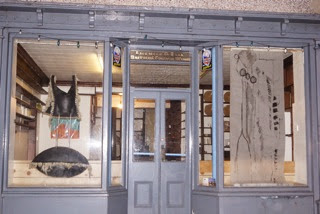When I was in the UK last year researching materials and settings for my dark ages novel, I met Veronica, a visual artist who is a friend of one of my ex-students. Veronica lives in Dolgellau, a small village I had chosen as a base of operations for my research activities in North Wales. She took me to her local upon my arrival and made me welcome. Later in the week she showed me one of her favourite walks, the Precipice Walk, which has views of Cader Idris and surrounding country. We spent a wonderful afternoon foraging on blackberries and talking about nature, culture and language, one main topic being the eventual loss of minority languages unless the speakers themselves stop reverting to English whenever communication becomes difficult.
We have kept in contact since my return to Australia and recently Veronica emailed me about Stiwdio Maelor, a new studio complex she has established in Lower Corris, a small village 10 miles from Dolgellau. The studio offers residencies for one to eight weeks and contains two spaces for visiting artists and one for a visiting writer. Each space has a bedroom and an artist or writer’s room and, because there are no telephones, television or internet, one can focus completely on one’s creative projects without interruption. The surrounding areas contain many walks through the beautiful Welsh landscape.
 |
| Front of Stiwdio Maelor Photo by Veronica Calarco |
So, I’ll be taking up an eight-week residency in early March next year, during which I will work on the second draft of my novel. I am thrilled to be going back to Wales, especially as I will be there in Spring, a season I have never experienced before in my previous travels to the UK, Ireland and Europe. And I am enormously grateful for the chance to spend a great block of time on my writing. I’m sure my adventures there will prompt some poems, too, and I will make sure to keep you all informed of my goings on.
 |
| The writer's room: no distractions but the view out the window. Photo by Veronica Calarco |
As being a writer is generally a lonely profession, I have always felt we should celebrate our accomplishments with those sympathetic communities we find ourselves in. Thank you for sharing my news. If you have had any recent achievements, let us know about them in the comments below.
Happy reading, musing, writing
Earl